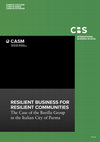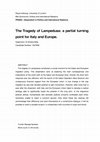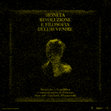Papers by Ettore Lancellotti

CASM White Paper Series, 2021
Current weather and climate trends are presenting a grim outlook ahead of us. An increasing numbe... more Current weather and climate trends are presenting a grim outlook ahead of us. An increasing number of communities are facing dramatic events and changing environmental settings. This new global challenge has probably contributed to the fortunes of the resilience paradigm, which has now spread to a countless number of scientific areas. However, a clear trend in resilience to climate change and weather extremes is the growing focus on communities as the real protagonists of this process. Nonetheless, a very limited and partial view of the community is often used, as the term translates to government, civil society, and individuals. But why are business actors always left out of the picture? Is business resilience not a real matter? Why are business and community resilience treated separately? If system thinking is a key to fight climate change and navigating through extreme weather events, then we must include all stakeholders in the picture.

The tragedy of Lampedusa constituted a crucial moment for the Italian and European migration poli... more The tragedy of Lampedusa constituted a crucial moment for the Italian and European migration policy. This dissertation aims at exploring the main consequences and implications of the event both at the Italian and European level. Overall, the short term response was very effective, with the launch of the Italian Operation Mare Nostrum and conspicuous financial support from the European Union. A true change in the way migration by sea was handled seemed to gain momentum. However, after more than a year after the shipwreck, both Italy and the European Union failed to develop a radical strategy able to significantly tackle the problem in the long term. In the respective political arenas, humanitarian and domestic political concerns contrasted each other, remaining unable to reach a common ground. Only when these two stances will acknowledge their difference and open themselves to a constructive dialogue, it will be possible to reach a durable solution, in collaboration with countries of origin and transit.
Books by Ettore Lancellotti
This is the last text written by Lapo Berti (1940-2017). It is an incomplete text (i.e. work in p... more This is the last text written by Lapo Berti (1940-2017). It is an incomplete text (i.e. work in progress) due to the sudden death of this important Marxist economist linked to the Italian Workerism of Mario Tronti and Antonio Negri. About him, Andrea Fumagalli has written : "Lapo Berti is one of the many activists that dedicated their lives to the quest of truth (in the sense of “parrhesia”) – a group that nowadays is very restricted, as busy as we all are in the performativity of appearing. He participated to the most important moments of the cultural break from the 1960s to the 1990s."

With projects such as Clock DVA and The Anti Group, Adi Newton investigated the philosophical, es... more With projects such as Clock DVA and The Anti Group, Adi Newton investigated the philosophical, esoteric and political resonances of the relationship between music, technology and image. Conversation with one of the greatest sound alchemists of all time. We publish the interview to Adi Newton contained in Chaos Variation III , the 12 “+ SD Card vinyl edition by Obsolete Capitalism and the same Adi Newton / TAG (The Anti-Group) just published by Rizosfera (NURKFM004/December 2018). Translation from English by Claudio Kulesko. Translations from Italian by Ettore Lancellotti and Letizia Rustichelli. We thank Adi Newton, Rizosfera and Obsolete Capitalism for availability.
This e.book contains the following interviews:
1) The dark side of technology. An interview with Clock Dva
by Kom Fut Manifesto, published in Decoder n.7 (1992), in ‘Manuale di Cultura Industriale’ Shake 1998, and re-published in 2011.
2) Endless Shifting: A Feast of Images Swallowed by Sound. An interview with Adi Newton by Jack Sargeant – Abraxas. An International Journal of Esoteric Studies. No 2, Summer Solstice 2011.
3) Esoteric Resonances and Magic Machines. An Interview with Adi Newton
by Obsolete Capitalism - in Chaos Variation III (vinyl+booklet, Rizosfera, 2018).
Visit our bandcamp page bit.ly/2EEBPnu

Obsolete Capitalism :: Control, modulation and algebra of evil in Burroughs and Deleuze :: e.book... more Obsolete Capitalism :: Control, modulation and algebra of evil in Burroughs and Deleuze :: e.book :: free download :: Rizosfera :: series of books The Strong of the Future :: SF016 :: eng :: english translation Ettore Lancellotti and Letizia Rustichelli :: cover and graphics Gabriele Fantuzzi :: september 2018
According to Deleuze’s Pourparler the concept of “Control” can be ascribed to William Burroughs. Since the seventies, it is possible to trace a deep intellectual and political convergence between Deleuze and Bur- roughs. This has happened across three levels of analysis: control society, revolutionary communities and schizo-culture. This essay attempts an analysis of the relationship between these two giants of twentieth century counterculture by borrowing their ‘control’ perspective. With the critical figure of Foucault on the background, the crucial political and philosophical passage from “discipline” to “control” appears in all its monstrosity. The struggle against Control, according to Deleuze and Burroughs, must be perpetrated through the invention of literary and philosophical “war machines” which try to hide from established knowledge and dominant powers by gathering in communities made of unassimilable singularities. Burroughs’ untraceable and diagrammatic critique seems ever more precious as it is completely strange to the conformism of contemporary critical thought.
Obsolete Capitalism :: Controllo, modulazione e algebra del male in Burroughs e Deleuze :: e.book :: free download :: Rizosfera :: collana editoriale I forti dell’avvenire :: SF016 :: ita :: copertina e grafica Gabriele Fantuzzi :: settembre 2018
Il presente testo è stato pubblicato online, con leggere modifiche, nel numero 3/2016 «La vita e il numero» della rivista filosofica La Deleuziana, a cura di Sara Baranzoni ed Emilia Marra. L’obiettivo principale del saggio era interrogare in profondità il rapporto tra Deleuze e Burroughs secondo la prospettiva concettuale del Controllo, termine dai confini quanto mai ambigui e indeterminati. Deleuze scrive in “Pourparler” che il concetto di “Controllo” è attribuibile a William Burroughs. Fin dagli anni ‘70 del Novecento, tra i due pensatori si è sviluppata una profonda affinità intellettuale e politica, sotto il segno dell’insegnamento esoterico-acefalico d’impronta nietzscheana. Tale affinità si dispiega su tre livelli di analisi: società di controllo, comunità rivoluzionarie e cultura schizo. Mantenendo la discorsività foucaultiana in primo piano, Deleuze rivela la signicativa transizione politico-sociale dalla “disciplina” al “controllo” in tutta la sua fredda mostruosità. Secondo Deleuze e Burroughs la lotta contro il Controllo avviene attraverso la sperimentazione di «macchine da guerra» letterarie, artistiche, filosofiche – dunque esistenziali – che divengono vere e proprie singolarità micro-comuniste non assimilate, in grado di sfuggire alla conoscenza dei saperi istituzionali e al dominio dei poteri delle nuove formazioni di sovranità numerica e algoritmica. La guerriglia asimmetrica, elettronico-diagrammatica, non lineare e “non localizzata”, di Burroughs si rivela uno strumento del tutto prezioso per le future lotte, alla luce soprattutto di un pensiero critico – nostro contemporaneo – troppo pigro, prevedibile e conformista, dal quale essa mantiene una inesorabile distanza siderale.

Tony D. Sampson è un docente della University of East London che si occupa di new media, filosof... more Tony D. Sampson è un docente della University of East London che si occupa di new media, filosofia e cultura digitale. Lavora da sempre su un impervio crocevia non convenzionale dove l’analisi politica non si discosta mai dall’analisi teorica del mondo digitale, dai comportamenti sociali e dalla critica degli eventi che in questi anni hanno sistematicamente connotato la nostra società. Scrivendo su argomenti quali i virus e la viralità della comunicazione, il contagio e l’imitazione comportamentale, il cervello e la neurocultura, cioè su quei segmenti altamente sensibili della nostra società nata dal connubio accelerato tra tecnologia e ideologia dei mercati manipolati dal valore e dal pro fitto, Tony D. Sampson riesce a cogliere con largo anticipo e con estrema lungimiranza alcuni dei temi dello scontro in atto tra controllo, tecnologia, società, e libertà individuali e di gruppo. Questo fa di lui, oltre che un brillante teorico dei nuovi media e della cultura digitale, un grande pensatore politico. Per questo motivo, l’esigenza di scandagliare con lui il suo ultimo libro ‘The Assemblage Brain’ (Minnesota Press, 2017) è urgente per capire quali s de si aprono dinnanzi a noi nel prossimo futuro.
Tony D. Sampson è docente di digital media culture all’Università di East London. Le sue pubblicazioni includono: The Spam Book, pubblicato insieme a Jussi Parikka (Hampton Press, 2009), Virality: Contagion Theory in the Age of Networks (University of Minne- sota Press, 2012), The Assemblage Brain: Sense Making in Neuroculture (University of Minnesota Press, Dec 2016) e Affect and Social Media, pubblicato insieme a Darren Ellis and Stephen Maddison (Rowman and Little eld, 2018). Tony è organizzatore di confe- renze su Affect e Social Media; co-fondatore del Club Critical Theory di Southend, Essex; direttore di EmotionUX Lab all’Università di East London. La sua ricerca si focalizza su un ampio spettro di interessi legati alla cultura dei media digitali, e si è specializzata in social media, viralità (contagio socio-digitale), modelli di rete, convergenza tra experience design (UX) e marke- ting, concatenamento e teoria degli affetti, critical human com- puter interaction (c-HCI), attivismo digitale e neurocultura (e.g. neuro-marketing, neuro-economia e neuro-estetica).
Il presente volume comprende interviste a Tony D. Sampson di Rizosfera, Jussi Parikka, Obsolete Capitalism, Rares Iordache e il saggio 'La teoria del contagio al di là del microbo' (CTheory, 2011).
Traduzione dall'inglese di Alessandro Cattini, Paolo Davoli, Ettore Lancellotti, Letizia Rustichelli.

"Money is the perpetual engine of relentless spherology which virtually belongs to it like darkne... more "Money is the perpetual engine of relentless spherology which virtually belongs to it like darkness belongs to light. In other words, the circularity of money draws bubbles in the shadow of its own flow. The roundness of irregular geometry is the gift that money offers in exchange for subscribing to its shadow. Money’s disproportionate stride triggers the generation of spheres whose fate is that of vitalistic explosion, which incinerates everything. The final burst is an obscure euphoria of the swelled shadow.
The features that financial bubbles have in common with electro bubbles are the data membranes which perpetually flow in the two directions of the interface. The data flow innervates both sides, the inside and the outside, leaving internal and external pressures free to peak and destroy the bubble itself. Bubbles emerge everywhere, from cryptocurrencies to the darker products of offshore financial markets. But how was the latter confronted by a different kind of (electro) bubble: the artificial one of electronic music, the realm of synthetic beats?"

Dromology, Bolidism and Marxist Accelerationism, an odd text by Obsolete Capitalism written in th... more Dromology, Bolidism and Marxist Accelerationism, an odd text by Obsolete Capitalism written in the summer of 2015, represents the rst endeavor in the speculative philosophical sphere known by the equally eccentric name of “accelerationism”. The main source of the book is Matteo Pasquinelli’s Algoritmi del Capitale (Ombre Corte, 2014), followed by other texts of contemporary authors such as Molecular Red by McKenzie Wark. However, Obsolete Capitalism has always rejected the label of “review”. In fact, they do not accept the triptych composed of the power gure of the critic, of the role that culture and philosophy assign to critique, and of the dapper halo of the know-it-all reader. As a result, the text is closer to Paul Klee’s semi-automatic rickety appliance, that is, the notorious Twittering machine, or to the saturated distortions and the soft entropy of A.R. Kane’s “suicidal kiss” in 69, rather than to a quasi-essay able to introduce itself in the national and international debate on accelerationism. The matter is that Obsolete Ca- pitalism did not and still does not identify itself in any nineteenth-century political classi cation bestowed on the multiple trends of this movement. Accelerationist thought, be that political or philosophical, does not exhaust itself in the philosophy of Nick Land or Nick Srnicek, among others. The core feature was, and still is, to refuse any form of identi cation, that is, it is necessary to perpetually trans-identify oneself, and question each model – be that the closest or the most distant one – in order to open spaces for experimentation and caosmosis, that is, for the unthinkable.
Obsolete Capitalism is a collective of pure independent research.

Questo testo di McKenzie Wark è importante per diverse ragioni. Presenta al pubblico internaziona... more Questo testo di McKenzie Wark è importante per diverse ragioni. Presenta al pubblico internazionale una lettura originale di una particolare variante della galassia accelerazionista, forse la più visionaria: l’afro-accelerazionismo, il cui alfiere principale e motore inarrestabile è Kodwo Eshun. "Afro-accelerazionismo/Black Accelerationism" si sofferma sul testo più innovativo espresso da questa tendenza culturale diasporica: ‘More brilliant than the sun’, uscito nel 1998 per la Quartet Books. Questo testo fu definito dallo stesso autore, K. Eshun, come «speculative acceleration» : la prima edizione della Quartet è ormai introvabile e la casa editrice Verso Books lo riproporrà, con addendum, nel 2018. McKenzie Wark è molto abile nel situare tale opera, e il pensiero che ne deriva, nel solco di quelle due decadi ‘90/00 in cui cyberpunk, drum and bass, Deleuze e Guattari, hackers, alter-net, Ccru e black music mutante fornirono una efficace barriera di energia alternativa alla trionfante cultura dei tecno-evangelisti e dei mercati dot.com... Ma contro le bolle speculative e certo pensiero speculativo contemporaneo fissato nei dualismi ripetitivi improduttivi, McKenzie Wark gioca la carta di un pensiero plastico e di una forza - la cultura nera, afro-futurista e afro-accelerazionista - che con grande freschezza offre immaginazione, sensibilità e divertimento. L’idea afro-accelerazionista del futuro, figlia di una cultura pop mutante (fumetti, fantascienza, black music) e di un’insofferenza reale e profonda alla regolarizzazione normativa occidentale, è profondamente conturbante. Ma proprio per questo motivo, è incredibilmente viva e pulsante. Il resoconto di McKenzie Wark sull’(afro)accelerazionismo è quanto di più seducente si possa trovare oggi nei circuiti accelerazionisti per sottrarre tale pensiero al museo dell’ideologia. Proprio quest’ultimo gesto, il più irriverente e paradossale, rende l’afro-accelerazionismo un grande attore politico, e una credibile forza del futuro.

Lapo Berti has been one of the first in Italy (2015) to express doubts on Srnicek e Williams’s te... more Lapo Berti has been one of the first in Italy (2015) to express doubts on Srnicek e Williams’s text and on their «postcapitalist planning» tesis. From his heretic post-operaist observatory Lapo Berti denounces in his «Accelerated Fantasies» some of the basic ideas of the manifesto, being the most interesting one the «constructionist fallacy» as an example of total faith in the compositional ability of a hi-tech socialist project. To be able to shape society according to one’s ideals as pointed out by «sacred texts», still represents the forbidden and Faustian dream on which «any communist project historically collapses». According to Berti, communism has been -and still is - a secularised, historized process, «discontinued goods» in Tronti’s words. Here lies the point of contact between the deleuzian-foucauldian-nietzschean «abstract accelerationist line» of the Strong of the Future and Berti’s thought. In view of the heterogeneity of the systems and powers overlapping our society today, it is no longer possible to oppose the simple speculative and abstract text of a totalizing theory, were it Srnicek and Williams’ s neo-marxist one.

The interview with Lapo Berti that follows is part of the collective volume «Money, Revolution an... more The interview with Lapo Berti that follows is part of the collective volume «Money, Revolution and Philosophy of the Future. Nietzsche and the Accelerationist politics in Deleuze, Foucault, Guattari and Klossowski» that will be published by Obsolete Capitalism Free Press in 2017.
Monetary research has represented in many different ways a common ground for many French Rhizospheric intellectuals throughout the 60s and 70s. They conceived money as the core instrument employed by advanced capitalist market economies to trigger the rapid and profound transformation which turned the Fordist industrial system into a new hi-tech financial global and delocalized form of production. The French Rhizosphere was not only able to understand the mutation of economic paradigm while this was still in progress, but it also conducted original and persuasive analyses of money starting from its early invention in Anatolia in the VIII century B.C. and in Ancient Gree- ce in the VII and VI century B.C. Hence, according to Rhizospheric thinkers, money is the chief accelerationist device deployed in the context «rapid domination» strategies conducted by modern global and nancial market economies.
The essay moves from the conceptual place where the philosophical plane faces the chaos (Deleuze-... more The essay moves from the conceptual place where the philosophical plane faces the chaos (Deleuze-Guattari/1991). From a deep distance trapped in the past and the discretion of the dawn, a different thought and a different culture (re)emerge. The book presents a new Deleuze, more accelerationist than Srnicek and Williams, more Antichristic than Nietzsche, more punk than the Sex Pistols, more esoteric than Bataille and more conspirator than Klossowski. Obsolete Capitalism sees Deleuze and Guattari’s Anti-Oedipus as the dynamite-book able to found a new revolutionary gnosis. Authors: Obsolete Capitalism; Translators Letizia Rustichelli and Ettore Lancellotti; Text revised by Edmund Berger.

On the occasion of the international conference entitled Deleuze Studies Conference 2016 (Virtual... more On the occasion of the international conference entitled Deleuze Studies Conference 2016 (Virtuality, becoming and life, 11-13 July 2016) that will take place at the Department of Philosophy, Communication and Visual Arts of University Tre in Rome, the collective Obsolete Capitalism presents a «Deleuze in Rome 2016/Remix Version» of the book «Moneta, rivoluzione e filosofia dell’avvenire. Nietzsche e la politica accelerazionista in Deleuze, Foucault, Guattari, Klossowski» with contributions in Italian and English language. Our conference will be on13th July 2016, from 2 to 3.30 pm in Room 13, along with the panel entitled “Countless Life. For a Liberation of Thought Wherever it is imprisoned - Deterritorializing Nietzsche" (chair: Charles Stivale). The panel Countless Life has been proposed and elaborated by the online philosophical magazine «La Deleuziana».
Contributors: Algorithmic Committee, Sara Baranzoni, Edmund Berger, Lapo Berti, Paolo Davoli, Ettore Lancellotti, Network Ensemble, Obsolete Capitalism, OCSS, Luca Roccatagliati, Letizia Rustichelli, Oliver Smith, Francesco Tacchini, Paolo Vignola.

Il libro “Moneta, rivoluzione e filosofia dell’avvenire. Nietzsche e la politica accelerazionista... more Il libro “Moneta, rivoluzione e filosofia dell’avvenire. Nietzsche e la politica accelerazionista in Deleuze, Foucault, Guattari, Klossowski” prende le mosse da un oscuro frammento di Nietzsche - I forti dell’avvenire - incastonato nel celebre passaggio dell’“accelerare il processo” situato nel punto cruciale di una delle opere filosofiche più dirompenti del secolo scorso: L’anti-Edipo di Deleuze e Guattari. Nell’antologia assemblata da Obsolete Capitalism a partire da Nietzsche emerge ciò che si potrebbe definire “accelerazionismo pulsionale” oppure accelerazionismo quantico che si esprime tramite una nuova politica di corpi, onde e forze e il cui rapporto con la «tecnologia» è mediato dal bricolage e dal do-it-yourself, dunque dalla «strada» e dalla «sperimentazione».
Ciò che passa non è un progetto, ma un’intensità, un campo di forze trasmettibili grazie a un contagio intermittente di onde pulsionali in continua propagazione. Si tratta di un’informe e deviata koinè, politica e artistica allo stesso tempo, una sorta di lingua franca urbana senza codici che attraversa il tempo ripetendosi nella variazione, grazie a comunità artistiche sediziose e irregolari il cui tratto distintivo è la differenziazione. Una koinè innumerevole, che porta ad un nuovo infinito, incommensurabile, ritmico.
Autori: Algorithmic Committee, Sara Baranzoni, Edmund Berger, Lapo Berti, Paolo Davoli, Ettore Lancellotti, Network Ensemble, Obsolete Capitalism, OCSS, Letizia Rustichelli, Francesco Tacchini, Paolo Vignola.
Thesis Chapters by Ettore Lancellotti









Uploads
Papers by Ettore Lancellotti
Books by Ettore Lancellotti
This e.book contains the following interviews:
1) The dark side of technology. An interview with Clock Dva
by Kom Fut Manifesto, published in Decoder n.7 (1992), in ‘Manuale di Cultura Industriale’ Shake 1998, and re-published in 2011.
2) Endless Shifting: A Feast of Images Swallowed by Sound. An interview with Adi Newton by Jack Sargeant – Abraxas. An International Journal of Esoteric Studies. No 2, Summer Solstice 2011.
3) Esoteric Resonances and Magic Machines. An Interview with Adi Newton
by Obsolete Capitalism - in Chaos Variation III (vinyl+booklet, Rizosfera, 2018).
Visit our bandcamp page bit.ly/2EEBPnu
According to Deleuze’s Pourparler the concept of “Control” can be ascribed to William Burroughs. Since the seventies, it is possible to trace a deep intellectual and political convergence between Deleuze and Bur- roughs. This has happened across three levels of analysis: control society, revolutionary communities and schizo-culture. This essay attempts an analysis of the relationship between these two giants of twentieth century counterculture by borrowing their ‘control’ perspective. With the critical figure of Foucault on the background, the crucial political and philosophical passage from “discipline” to “control” appears in all its monstrosity. The struggle against Control, according to Deleuze and Burroughs, must be perpetrated through the invention of literary and philosophical “war machines” which try to hide from established knowledge and dominant powers by gathering in communities made of unassimilable singularities. Burroughs’ untraceable and diagrammatic critique seems ever more precious as it is completely strange to the conformism of contemporary critical thought.
Obsolete Capitalism :: Controllo, modulazione e algebra del male in Burroughs e Deleuze :: e.book :: free download :: Rizosfera :: collana editoriale I forti dell’avvenire :: SF016 :: ita :: copertina e grafica Gabriele Fantuzzi :: settembre 2018
Il presente testo è stato pubblicato online, con leggere modifiche, nel numero 3/2016 «La vita e il numero» della rivista filosofica La Deleuziana, a cura di Sara Baranzoni ed Emilia Marra. L’obiettivo principale del saggio era interrogare in profondità il rapporto tra Deleuze e Burroughs secondo la prospettiva concettuale del Controllo, termine dai confini quanto mai ambigui e indeterminati. Deleuze scrive in “Pourparler” che il concetto di “Controllo” è attribuibile a William Burroughs. Fin dagli anni ‘70 del Novecento, tra i due pensatori si è sviluppata una profonda affinità intellettuale e politica, sotto il segno dell’insegnamento esoterico-acefalico d’impronta nietzscheana. Tale affinità si dispiega su tre livelli di analisi: società di controllo, comunità rivoluzionarie e cultura schizo. Mantenendo la discorsività foucaultiana in primo piano, Deleuze rivela la signicativa transizione politico-sociale dalla “disciplina” al “controllo” in tutta la sua fredda mostruosità. Secondo Deleuze e Burroughs la lotta contro il Controllo avviene attraverso la sperimentazione di «macchine da guerra» letterarie, artistiche, filosofiche – dunque esistenziali – che divengono vere e proprie singolarità micro-comuniste non assimilate, in grado di sfuggire alla conoscenza dei saperi istituzionali e al dominio dei poteri delle nuove formazioni di sovranità numerica e algoritmica. La guerriglia asimmetrica, elettronico-diagrammatica, non lineare e “non localizzata”, di Burroughs si rivela uno strumento del tutto prezioso per le future lotte, alla luce soprattutto di un pensiero critico – nostro contemporaneo – troppo pigro, prevedibile e conformista, dal quale essa mantiene una inesorabile distanza siderale.
Tony D. Sampson è docente di digital media culture all’Università di East London. Le sue pubblicazioni includono: The Spam Book, pubblicato insieme a Jussi Parikka (Hampton Press, 2009), Virality: Contagion Theory in the Age of Networks (University of Minne- sota Press, 2012), The Assemblage Brain: Sense Making in Neuroculture (University of Minnesota Press, Dec 2016) e Affect and Social Media, pubblicato insieme a Darren Ellis and Stephen Maddison (Rowman and Little eld, 2018). Tony è organizzatore di confe- renze su Affect e Social Media; co-fondatore del Club Critical Theory di Southend, Essex; direttore di EmotionUX Lab all’Università di East London. La sua ricerca si focalizza su un ampio spettro di interessi legati alla cultura dei media digitali, e si è specializzata in social media, viralità (contagio socio-digitale), modelli di rete, convergenza tra experience design (UX) e marke- ting, concatenamento e teoria degli affetti, critical human com- puter interaction (c-HCI), attivismo digitale e neurocultura (e.g. neuro-marketing, neuro-economia e neuro-estetica).
Il presente volume comprende interviste a Tony D. Sampson di Rizosfera, Jussi Parikka, Obsolete Capitalism, Rares Iordache e il saggio 'La teoria del contagio al di là del microbo' (CTheory, 2011).
Traduzione dall'inglese di Alessandro Cattini, Paolo Davoli, Ettore Lancellotti, Letizia Rustichelli.
The features that financial bubbles have in common with electro bubbles are the data membranes which perpetually flow in the two directions of the interface. The data flow innervates both sides, the inside and the outside, leaving internal and external pressures free to peak and destroy the bubble itself. Bubbles emerge everywhere, from cryptocurrencies to the darker products of offshore financial markets. But how was the latter confronted by a different kind of (electro) bubble: the artificial one of electronic music, the realm of synthetic beats?"
Obsolete Capitalism is a collective of pure independent research.
Monetary research has represented in many different ways a common ground for many French Rhizospheric intellectuals throughout the 60s and 70s. They conceived money as the core instrument employed by advanced capitalist market economies to trigger the rapid and profound transformation which turned the Fordist industrial system into a new hi-tech financial global and delocalized form of production. The French Rhizosphere was not only able to understand the mutation of economic paradigm while this was still in progress, but it also conducted original and persuasive analyses of money starting from its early invention in Anatolia in the VIII century B.C. and in Ancient Gree- ce in the VII and VI century B.C. Hence, according to Rhizospheric thinkers, money is the chief accelerationist device deployed in the context «rapid domination» strategies conducted by modern global and nancial market economies.
Contributors: Algorithmic Committee, Sara Baranzoni, Edmund Berger, Lapo Berti, Paolo Davoli, Ettore Lancellotti, Network Ensemble, Obsolete Capitalism, OCSS, Luca Roccatagliati, Letizia Rustichelli, Oliver Smith, Francesco Tacchini, Paolo Vignola.
Ciò che passa non è un progetto, ma un’intensità, un campo di forze trasmettibili grazie a un contagio intermittente di onde pulsionali in continua propagazione. Si tratta di un’informe e deviata koinè, politica e artistica allo stesso tempo, una sorta di lingua franca urbana senza codici che attraversa il tempo ripetendosi nella variazione, grazie a comunità artistiche sediziose e irregolari il cui tratto distintivo è la differenziazione. Una koinè innumerevole, che porta ad un nuovo infinito, incommensurabile, ritmico.
Autori: Algorithmic Committee, Sara Baranzoni, Edmund Berger, Lapo Berti, Paolo Davoli, Ettore Lancellotti, Network Ensemble, Obsolete Capitalism, OCSS, Letizia Rustichelli, Francesco Tacchini, Paolo Vignola.
Thesis Chapters by Ettore Lancellotti
This e.book contains the following interviews:
1) The dark side of technology. An interview with Clock Dva
by Kom Fut Manifesto, published in Decoder n.7 (1992), in ‘Manuale di Cultura Industriale’ Shake 1998, and re-published in 2011.
2) Endless Shifting: A Feast of Images Swallowed by Sound. An interview with Adi Newton by Jack Sargeant – Abraxas. An International Journal of Esoteric Studies. No 2, Summer Solstice 2011.
3) Esoteric Resonances and Magic Machines. An Interview with Adi Newton
by Obsolete Capitalism - in Chaos Variation III (vinyl+booklet, Rizosfera, 2018).
Visit our bandcamp page bit.ly/2EEBPnu
According to Deleuze’s Pourparler the concept of “Control” can be ascribed to William Burroughs. Since the seventies, it is possible to trace a deep intellectual and political convergence between Deleuze and Bur- roughs. This has happened across three levels of analysis: control society, revolutionary communities and schizo-culture. This essay attempts an analysis of the relationship between these two giants of twentieth century counterculture by borrowing their ‘control’ perspective. With the critical figure of Foucault on the background, the crucial political and philosophical passage from “discipline” to “control” appears in all its monstrosity. The struggle against Control, according to Deleuze and Burroughs, must be perpetrated through the invention of literary and philosophical “war machines” which try to hide from established knowledge and dominant powers by gathering in communities made of unassimilable singularities. Burroughs’ untraceable and diagrammatic critique seems ever more precious as it is completely strange to the conformism of contemporary critical thought.
Obsolete Capitalism :: Controllo, modulazione e algebra del male in Burroughs e Deleuze :: e.book :: free download :: Rizosfera :: collana editoriale I forti dell’avvenire :: SF016 :: ita :: copertina e grafica Gabriele Fantuzzi :: settembre 2018
Il presente testo è stato pubblicato online, con leggere modifiche, nel numero 3/2016 «La vita e il numero» della rivista filosofica La Deleuziana, a cura di Sara Baranzoni ed Emilia Marra. L’obiettivo principale del saggio era interrogare in profondità il rapporto tra Deleuze e Burroughs secondo la prospettiva concettuale del Controllo, termine dai confini quanto mai ambigui e indeterminati. Deleuze scrive in “Pourparler” che il concetto di “Controllo” è attribuibile a William Burroughs. Fin dagli anni ‘70 del Novecento, tra i due pensatori si è sviluppata una profonda affinità intellettuale e politica, sotto il segno dell’insegnamento esoterico-acefalico d’impronta nietzscheana. Tale affinità si dispiega su tre livelli di analisi: società di controllo, comunità rivoluzionarie e cultura schizo. Mantenendo la discorsività foucaultiana in primo piano, Deleuze rivela la signicativa transizione politico-sociale dalla “disciplina” al “controllo” in tutta la sua fredda mostruosità. Secondo Deleuze e Burroughs la lotta contro il Controllo avviene attraverso la sperimentazione di «macchine da guerra» letterarie, artistiche, filosofiche – dunque esistenziali – che divengono vere e proprie singolarità micro-comuniste non assimilate, in grado di sfuggire alla conoscenza dei saperi istituzionali e al dominio dei poteri delle nuove formazioni di sovranità numerica e algoritmica. La guerriglia asimmetrica, elettronico-diagrammatica, non lineare e “non localizzata”, di Burroughs si rivela uno strumento del tutto prezioso per le future lotte, alla luce soprattutto di un pensiero critico – nostro contemporaneo – troppo pigro, prevedibile e conformista, dal quale essa mantiene una inesorabile distanza siderale.
Tony D. Sampson è docente di digital media culture all’Università di East London. Le sue pubblicazioni includono: The Spam Book, pubblicato insieme a Jussi Parikka (Hampton Press, 2009), Virality: Contagion Theory in the Age of Networks (University of Minne- sota Press, 2012), The Assemblage Brain: Sense Making in Neuroculture (University of Minnesota Press, Dec 2016) e Affect and Social Media, pubblicato insieme a Darren Ellis and Stephen Maddison (Rowman and Little eld, 2018). Tony è organizzatore di confe- renze su Affect e Social Media; co-fondatore del Club Critical Theory di Southend, Essex; direttore di EmotionUX Lab all’Università di East London. La sua ricerca si focalizza su un ampio spettro di interessi legati alla cultura dei media digitali, e si è specializzata in social media, viralità (contagio socio-digitale), modelli di rete, convergenza tra experience design (UX) e marke- ting, concatenamento e teoria degli affetti, critical human com- puter interaction (c-HCI), attivismo digitale e neurocultura (e.g. neuro-marketing, neuro-economia e neuro-estetica).
Il presente volume comprende interviste a Tony D. Sampson di Rizosfera, Jussi Parikka, Obsolete Capitalism, Rares Iordache e il saggio 'La teoria del contagio al di là del microbo' (CTheory, 2011).
Traduzione dall'inglese di Alessandro Cattini, Paolo Davoli, Ettore Lancellotti, Letizia Rustichelli.
The features that financial bubbles have in common with electro bubbles are the data membranes which perpetually flow in the two directions of the interface. The data flow innervates both sides, the inside and the outside, leaving internal and external pressures free to peak and destroy the bubble itself. Bubbles emerge everywhere, from cryptocurrencies to the darker products of offshore financial markets. But how was the latter confronted by a different kind of (electro) bubble: the artificial one of electronic music, the realm of synthetic beats?"
Obsolete Capitalism is a collective of pure independent research.
Monetary research has represented in many different ways a common ground for many French Rhizospheric intellectuals throughout the 60s and 70s. They conceived money as the core instrument employed by advanced capitalist market economies to trigger the rapid and profound transformation which turned the Fordist industrial system into a new hi-tech financial global and delocalized form of production. The French Rhizosphere was not only able to understand the mutation of economic paradigm while this was still in progress, but it also conducted original and persuasive analyses of money starting from its early invention in Anatolia in the VIII century B.C. and in Ancient Gree- ce in the VII and VI century B.C. Hence, according to Rhizospheric thinkers, money is the chief accelerationist device deployed in the context «rapid domination» strategies conducted by modern global and nancial market economies.
Contributors: Algorithmic Committee, Sara Baranzoni, Edmund Berger, Lapo Berti, Paolo Davoli, Ettore Lancellotti, Network Ensemble, Obsolete Capitalism, OCSS, Luca Roccatagliati, Letizia Rustichelli, Oliver Smith, Francesco Tacchini, Paolo Vignola.
Ciò che passa non è un progetto, ma un’intensità, un campo di forze trasmettibili grazie a un contagio intermittente di onde pulsionali in continua propagazione. Si tratta di un’informe e deviata koinè, politica e artistica allo stesso tempo, una sorta di lingua franca urbana senza codici che attraversa il tempo ripetendosi nella variazione, grazie a comunità artistiche sediziose e irregolari il cui tratto distintivo è la differenziazione. Una koinè innumerevole, che porta ad un nuovo infinito, incommensurabile, ritmico.
Autori: Algorithmic Committee, Sara Baranzoni, Edmund Berger, Lapo Berti, Paolo Davoli, Ettore Lancellotti, Network Ensemble, Obsolete Capitalism, OCSS, Letizia Rustichelli, Francesco Tacchini, Paolo Vignola.